The 2020 Mac Mini Unleashed: Putting Apple Silicon M1 To The Test
by Andrei Frumusanu on November 17, 2020 9:00 AM ESTBenchmarks: Whatever Is Available
As we’ve had very little time with the Mac mini, and the fact that this not only is a macOS system, but a new Arm64-based macOS system, our usual benchmark choices that we tend to use aren’t really available to us. We’ve made due with a assortment of available tests at the time of the launch to give us a rough idea of the performance:
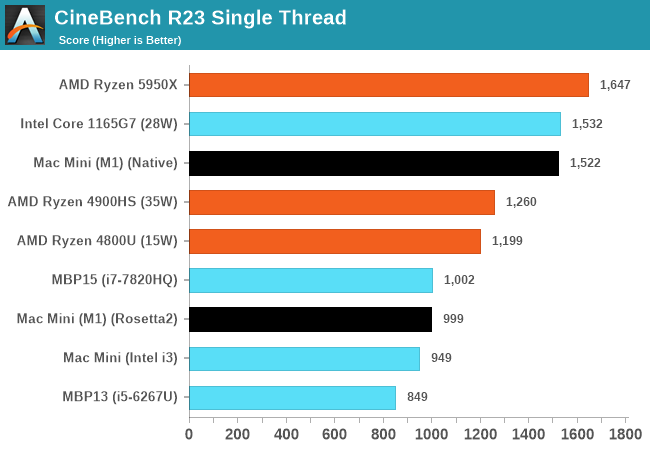
One particular benchmark that sees the first light of day on macOS as well as Apple Silicon is Cinebench. In this first-time view of the popular Cinema4D based benchmark, we see the Apple M1 toe-to-toe with the best-performing x86 CPUs on the market, vastly outperforming past Apple iterations of Intel silicon. The M1 here loses out to Zen3 and Tiger Lake CPUs, which still seem to have an advantage, although we’re not sure of the microarchitectural characteristics of the new benchmark.
What’s notable is the performance of the Rosetta2 run of the benchmark when in x86 mode, which is not only able to keep up with past Mac iterations but still also beat them.
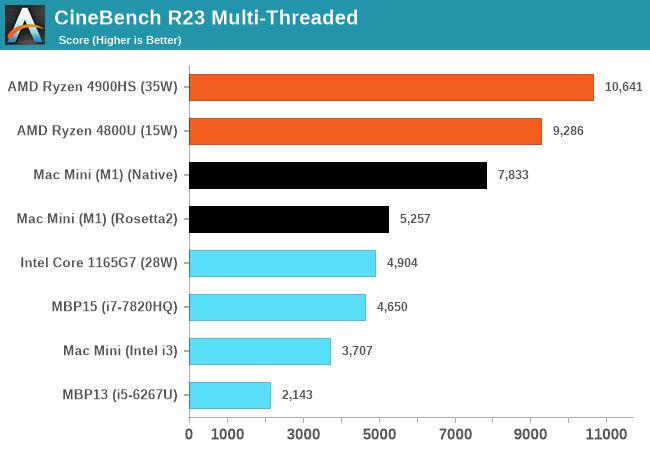
In the multi-threaded R23 runs, the M1 absolutely dominates past Macs with similar low-power CPUs. Just as of note, we’re trying to gather more data on other systems as we have access to them, and expand the graph in further updates of the article past publishing.
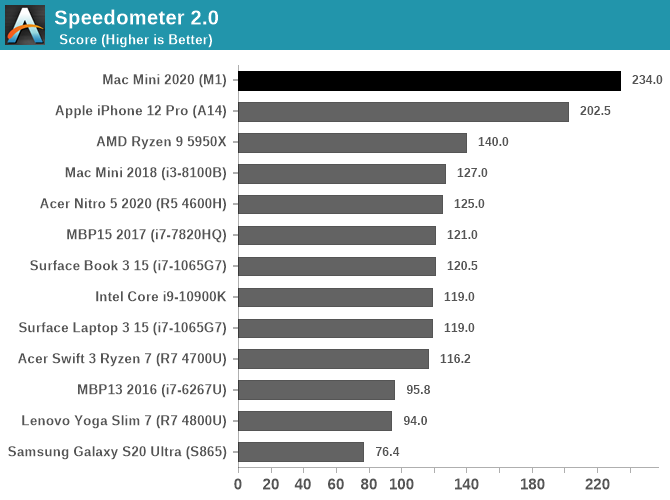
In browser-benchmarks we’ve known Apple’s CPUs to very much dominate across the landscape, but there were doubts as to whether this was due to the CPUs themselves in the iPhone or rather just the browsers and browser engines. Now running on macOS and desktop Safari, being able to compare data to other Intel Mac systems, we can come to the conclusion that the performance advantage is due to Apple’s CPU designs.
Web-browsing performance seems to be an extremely high priority for Apple’s CPU, and this makes sense as it’s the killer workload for mobile SoCs and the workload that one uses the most in everyday life.
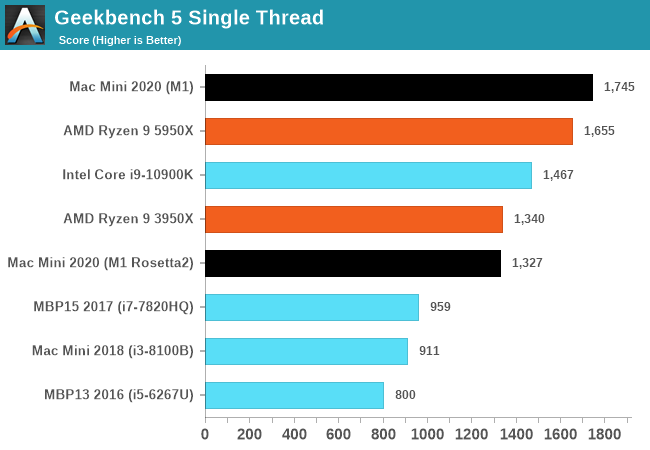
In Geekbench 5, the M1 does again extremely well as it actually takes the lead in our performance figures. Even when running in x86 compatibility mode, the M1 is able to match the top single-threaded performance of last generation’s high-end CPUs, and vastly exceed that of past iterations of the Mac mini and past Macbooks.
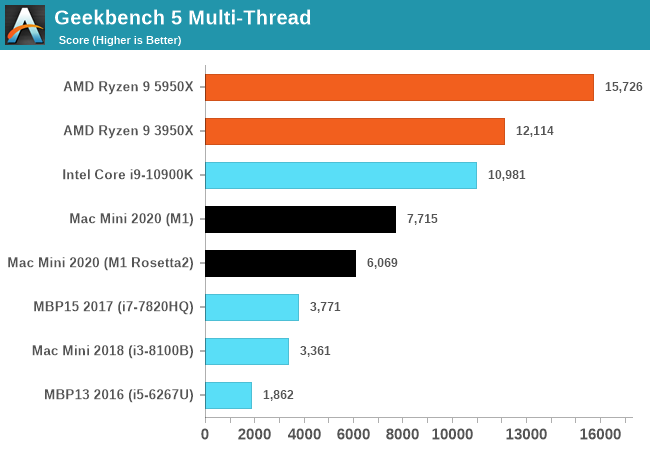
Multi-threaded performance is a matter of core-count and power efficiency of a design. The M1 here demolishes a 2017 15-inch Macbook Pro with an Intel i7-7820HQ with 4 cores and 8 threads, posting over double the score. We’ll be adding more data-points as we collect them.


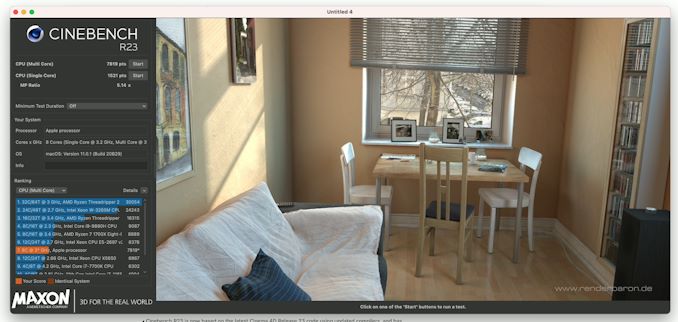








682 Comments
View All Comments
BushLin - Wednesday, November 18, 2020 - link
Do you have any idea what you're talking about or is it simply that whatever Apple are doing must be ideal?I'm sure Intel are gutted about continuing to not meet the huge demand for their x86 chips on a fabrication process two generations out of date.
Also, the same power envelope AMD is beating out the M1 on an old design and fab process.
Spunjji - Monday, November 23, 2020 - link
@BushLin - "I'm sure Intel are gutted about continuing to not meet the huge demand for their x86 chips on a fabrication process two generations out of date."This is the exact kind of nonsense that makes me disappointed every time I see a reply from you to one of my posts on this thread.
BushLin - Monday, November 23, 2020 - link
I was replying to "It’s just simply that x86-64 is a hinderance to AMD and Intel"Maybe don't take technical/factual matters so emotionally. Also, wasn't a reply to you unless you have many accounts.
NetMage - Monday, November 23, 2020 - link
Maybe take your own advice?BushLin - Tuesday, November 24, 2020 - link
How many accounts do you need?markiz - Thursday, November 19, 2020 - link
Ok, but do you imagine apple will not have advanced by then?I'm pretty sure they have a long pipeline ready for the next decade.
Steven Choi 4321 - Friday, November 20, 2020 - link
Sure, amd wins with $700 chip vs $40 M1. Amd and intell are the nokia and blackberry of the time.hagjohn - Tuesday, November 24, 2020 - link
AMD is killing it. M1 is the entry level CPU (SoC) attempt from Apple. I think it is pretty good, considering it can go up against an i9. The way the M1 SoC is put together has some advantages and disadvantages. A big disadvantage is everything is build on the SoC, so if you want to add memory or change out an SSD, you are out of luck. Anything that breaks in the SoC and you need a new computer. A big advantage is that with everything on the SoC, Apple has removed a lot of the latency that we can see in intel/AMD systems.And remember... M1 is the entry level CPU (SoC) from Apple. Wait till we get towards the more Pro versions.
name99 - Wednesday, November 18, 2020 - link
Andrei, are those L1$ bandwidth numbers correct? They look off to me.Specifically 100~3*2*16, ie 3GHz times 2 loads/cycle, each 128 hits (ie 16B) wide. (Either load pair of int registers, or load of a neon register).
BUT the A14 article said there were three load units...
Are three loads/cycle only sustainable for a very short time?
A second item of interest is does the test even try to use Load Pair or Load Pair Nontemporal of two NEON registers? Earlier A cores had a 128bit per load/store unit path to L1, so there was no bandwidth win in loading a pair of vectors, but at some point presumably this might change...
Frantisek - Sunday, December 20, 2020 - link
Are you planing to review any of M1 laptops so you can cover results in comparable laptops tests?